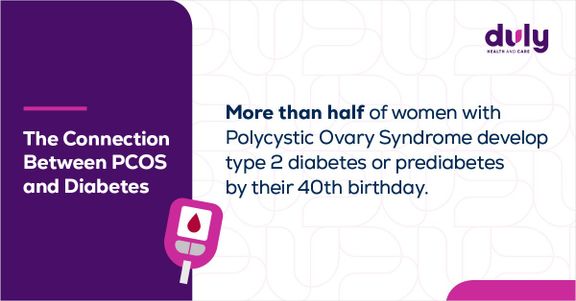You’re 16 years old and still haven’t had your first menstrual period. Or, you’re in your 30s, and struggling to get pregnant. Or maybe, you’re nearing menopause and your periods are suddenly becoming regular, despite having been irregular most of your adult life.
In any of these scenarios, polycystic ovary syndrome may be to blame.
Polycystic ovary syndrome (PCOS) is a condition that occurs when a woman’s body produces more male hormones than they are supposed to, creating an imbalance in her reproductive hormones. PCOS causes fluid-filled sacs called cysts to grow on the ovaries (the part of the body that produces the egg released each month during a woman’s menstrual period). The hormonal imbalance also leads to problems in the ovaries like irregular periods, infertility, or excessive body hair.
Even though most women with PCOS find out they have it in their 20s and 30s, PCOS can affect women and girls of all ages during their reproductive years (ages 15 – 44) — and which phase of life you are in can play a role in how PCOS affects you.
Here is what you can expect at different ages when you have PCOS when you are …
… A Teenager
During ovulation, your ovary releases an egg so that it can be fertilized by sperm. If you have PCOS, the egg might not have developed correctly or might not be released. This interferes with the menstrual cycle, causing missed or irregular periods.
Menstrual irregularities from PCOS can happen at any age, but there is something unique to the adolescent and teenage years: getting your first period.
When a woman does not start menstruating by age 15, it is called primary amenorrhea. Since PCOS is among the leading causes of primary amenorrhea, getting your first period after age 15 may be one of the first clues that you have PCOS.
… A Young Adult
Many women do not learn that they have PCOS until they see a provider because they are having trouble getting pregnant. This is a fairly common scenario — PCOS is the number one cause of infertility in the US.
Fortunately, it’s also a treatable cause of infertility in most cases.
For most women with PCOS who are struggling with infertility, the cause is anovulation (not ovulating). Sometimes, making certain lifestyle changes can increase your likelihood of getting pregnant. For example, research has found that among women with PCOS who are obese, losing even a small amount of weight can trigger changes in their bodies and their menstrual function — changes that may help restore ovulation and improve the chances of getting pregnant.
Your provider may also prescribe medication, like letrozole or metformin, to increase ovulation.
If these methods don’t work, your provider may recommend in vitro fertilization (IVF) — a procedure where an egg is fertilized outside of the body and then placed into the uterus.
… Pregnant
Having PCOS doesn’t mean that you can’t have a healthy pregnancy. However, it does mean that you’re at a higher risk for certain complications. Compared to women without PCOS, those with PCOS experience higher rates of:
- Miscarriage
- Preeclampsia (high blood pressure, as well as signs of kidney or liver damage after 20 weeks of pregnancy)
- Gestational diabetes (diabetes that is only present during pregnancy)
- Delivery via Cesarean section (C‑section)
- Preterm birth (birth before 37 weeks of pregnancy)
Also, babies of women with PCOS have a higher risk of being heavy or of needing to stay in the neonatal intensive care unit (NICU).
Your healthcare providers can help you develop a plan for nutrition, exercise, weight management, blood sugar control, and vitamin intake to keep you and your baby healthy during pregnancy.
If you are concerned that you may have PCOS, or want to talk to a provider about living healthily with PCOS, make an appointment with a Duly Health and Care women’s health provider or endocrinologist.
… Approaching Menopause
Menopause is when it has been 12 months since your last menstrual period. The time leading up to that, when your monthly cycle changes and you start having those dreaded hot flashes, is called perimenopause.
Many women with PCOS enter menopause later in life — typically, around 2 years later than women without PCOS. As they approach menopause, some women with PCOS start to have more regular periods.
After menopause, some women find that their symptoms improve, but others continue to have symptoms. Also, some of the health risks that come with having PCOS do remain and continue to increase with age.
… Any Age
At any age, having PCOS means you may be at risk for having additional health concerns. PCOS has been associated with:
- Diabetes. Many women with PCOS are insulin-resistant, meaning their bodies produce enough insulin but don’t use it correctly. This increases the risk for type 2 diabetes.
- High blood pressure and high “bad” cholesterol. Both of these increase the risk for heart attack and stroke.
- Sleep apnea. This disorder causes momentary pauses in breathing while sleeping, and increases your risk for type 2 diabetes and heart disease.
- Endometrial cancer. The risk of developing cancer in the endometrium (the lining of the womb or uterus) is higher in women who have obesity, insulin resistance, diabetes, and ovulation problems — all of which are common in women with PCOS.
- Depression and anxiety.

More than half of women with Polycystic Ovary Syndrome develop type 2 diabetes or prediabetes by their 40th birthday.
It’s still unclear whether PCOS itself leads to these conditions or if there’s an underlying issue that is causing both PCOS and other conditions. But since there is a clear association, it is essential for women with PCOS to be aware of their elevated risks, and work with their providers to decrease these risks as much as possible.
What’s Next?
If you have PCOS, check with your women’s health provider about treatment options. While there isn’t a cure, there are ways to manage symptoms so that PCOS doesn’t need to stand in your way.
Health Topics:








